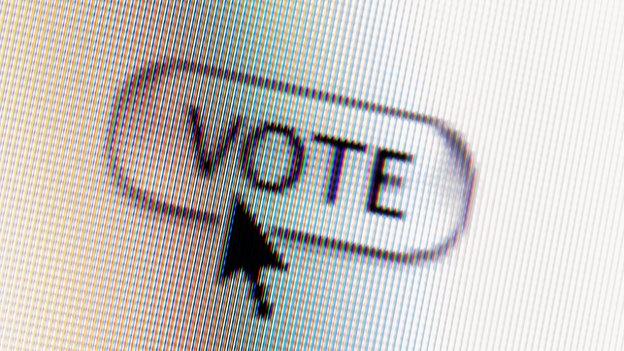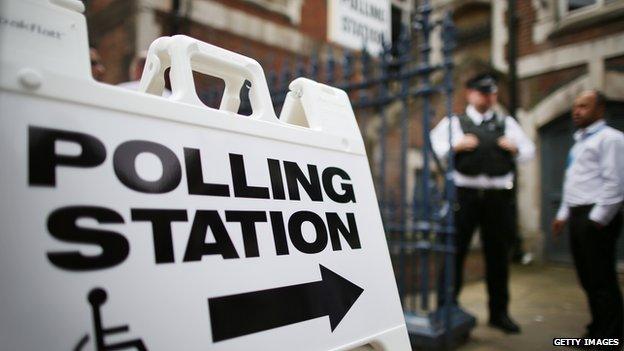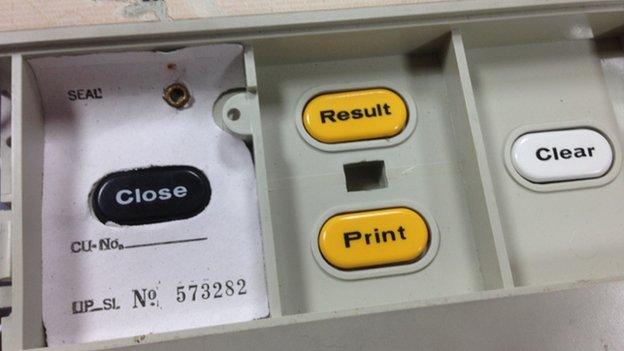Would online voting help engage more young people in politics?
- Published

It's a guilty secret shared by many people at every election day.
"I meant to vote but I never quite got round to it."
It might have been raining, you might have worked late or you're sat in the pub and don't want to leave early.
Whatever the excuse, it's generally accepted that people not exercising their right to vote is unhealthy in a democracy.
The problem of low voter turnout is particularly bad among young people. In the 2010 General Election 44% of 18 to 24-year-olds had their say.
Some campaigners believe one of the problems is the actual process of voting itself.
Instead of queuing up at the local school or village hall to use a pen and paper, there are claims more people would vote if they could simply make the choice via the internet.
Antonio Mugica is the CEO of Smartmatic, a company that provides electronic voting technology across the globe.
His company has provided electronic voting machines for recent elections in Bulgaria, Estonia and the Philippines.

Antonio Mugica is CEO of electronic voting company Smartmatic
"We are seeing a worldwide trend from pen and paper to different technologies for voting," he says.
"There's no doubt that electronic voting can only help improve a democracy."
Although technology already exists for online voting, Estonia remains the only country to adopt it.
In the 2014 European Parliament elections Estonian voters were able to attend a polling station or log on via their smartphone or PC and select their candidate.
Using a national database of all its citizens, people are able to vote from any computer anywhere in the world using an identity card.

Campaigners say the idea of voting with pen and paper at polling stations is outdated
Last year, BBC Three's Free Speech presenter Rick Edwards delivered a speech on how to engage younger people in politics in the UK.
One of his suggestions included the implementation of online voting in the UK.
"It's crazy that in 2015 we're expecting young people to queue up to tick a box on a bit of paper. Young people are digital natives. We've got to take voting to where they are."
However, the major stumbling block to online voting can be summed up in one word: security.
Critics claim the existing technology is too vulnerable to hacking and would make it too easy to rig the result.
It's the main reason electronic voting still doesn't exist in the UK.
There's also the issue of keeping voters' rights to privacy.
In December, Jimmy Wales, the founder of Wikipedia told the BBC he didn't support the idea of online voting.
"Voting from home and not behind a curtain in a public place may mean that for certain kinds of people in society their votes may be coerced or bought."
Antonio Mugica agrees that online voting technology can still be improved and made safer but is still a more secure option than postal voting.

Electronic vote counter used in India
He also argues that even if the UK isn't yet ready to introduce online voting, it could still take a small digital step by introducing electronic voting booths at polling stations.
"The transition from pen and paper to a machine would provide a sense of novelty and is likely to make people more interested in making the journey to a polling station.
"Critics have always pointed to the security but nothing is easier to hack than a piece of paper and a pen.
"Why do you have computers in planes? Why do you have computers in nuclear warhead systems? Because they're safer."
His views are supported by House of Commons Speaker John Bercow who claims there is a strong argument for electronic voting to be introduced as long as the security of the system can be guaranteed.
However, Antonio says technology could be a partial help in increasing the numbers of young people voting.
"This is not the silver bullet. It will contribute in a positive way but politicians need to engage and make people interested in the big topics at hand."
Follow @BBCNewsbeat, external on Twitter, BBCNewsbeat, external on Instagram and Radio1Newsbeat, external on YouTube